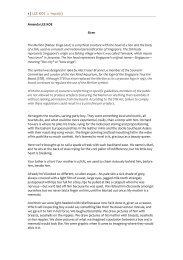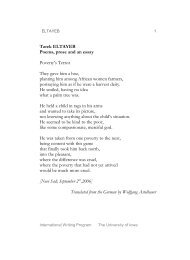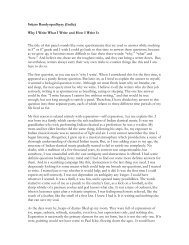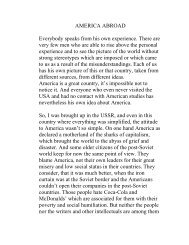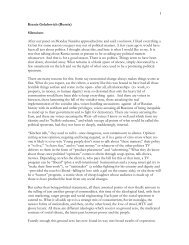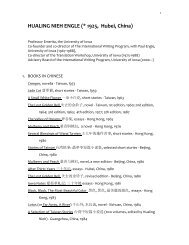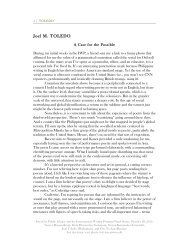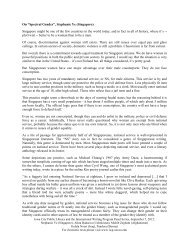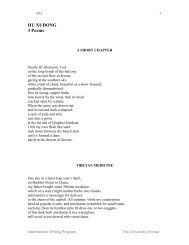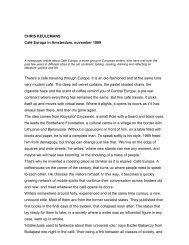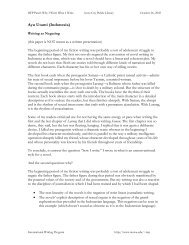LiteratureâTranslationâCriticism K.V. Tirumalesh Today's world is ...
LiteratureâTranslationâCriticism K.V. Tirumalesh Today's world is ...
LiteratureâTranslationâCriticism K.V. Tirumalesh Today's world is ...
You also want an ePaper? Increase the reach of your titles
YUMPU automatically turns print PDFs into web optimized ePapers that Google loves.
th<strong>is</strong> idea seriously enough in h<strong>is</strong> essay “The Task of the Translator.” He too appeals to<br />
the notion of a primordial language; translation, according to him, can make a language<br />
to go back to th<strong>is</strong> primordiality to rejuvenate itself. Indeed, as current theories of<br />
translation have shown, it <strong>is</strong> difficult to lay down any rule for translation; one has to<br />
accept the fact that when cultural variables and contingencies are so many, translation<br />
cannot but be multifarious. What <strong>is</strong> important <strong>is</strong> the interest in the other and all<br />
translations stem from that basic fact. Often, translation may be based on a m<strong>is</strong>reading of<br />
the original text but it still can have a galvanizing effect on the language.<br />
But cultural contact <strong>is</strong> also basically corrosive: a dominant culture may just<br />
gobble up a small culture. The example from language contact may be illustrative. It <strong>is</strong><br />
said that bilingual<strong>is</strong>m <strong>is</strong> the first step towards hara-kiri. When the native speakers of a<br />
small language come into contact with a dominant language, especially the language of<br />
the colonizers, the speakers learn the new language of power, become bilingual, develop<br />
an inferiority complex about their own language, use it less and less, force their children<br />
to learn the language of the masters and let their native language die. Not only the<br />
languages of the masters but also their religion, food, dress and such other practices<br />
become the model to follow. Translation from a dominant language to a subordinate one<br />
always has th<strong>is</strong> r<strong>is</strong>k, but the r<strong>is</strong>k has to be taken. There <strong>is</strong> no other way.<br />
Just like language, literature too works at multiple levels: we talk about universal<br />
language, Chomsky’s Universal Grammar, which <strong>is</strong> a defining feature of humanity<br />
without reference to race, creed and culture. There are also languages and their dialects.<br />
Nobody speaks a universal language, not even a language but only a dialect or an<br />
idiolect. Similarly, we talk about World Literature, but nobody writes or reads World<br />
Literature; we write and read regional literatures only. What then <strong>is</strong> th<strong>is</strong> relationship<br />
between universality and locality Seamus Heaney says that every poet has double<br />
citizenship—he <strong>is</strong> a citizen of h<strong>is</strong> locality as well as a citizen of conscience. When one<br />
enters literature, one enters these two realms simultaneously. You cannot be in one<br />
without at the same time being in the other.<br />
Literature today <strong>is</strong> a much contested field. Some years ago one could safely say<br />
what <strong>is</strong> meant by literature but today it <strong>is</strong> everything or nothing. Th<strong>is</strong> <strong>is</strong> mainly because<br />
of the inexorable advancement of Literary Theory—which in itself <strong>is</strong> an agon<strong>is</strong>tic realm<br />
of conceptual frameworks. It <strong>is</strong> common knowledge now that books of critic<strong>is</strong>m sell<br />
better than poetry and many writers are d<strong>is</strong>mayed by th<strong>is</strong>. Certainly Theory holds a<br />
fascination for many young people. Creative writers are piqued by the fact that a<br />
‘secondary’ and ‘parasitical’ mode should steal a march over a ‘primary’ and<br />
‘autonomous’ mode like poetry. But th<strong>is</strong> <strong>is</strong> a m<strong>is</strong>taken notion; theory or literary critic<strong>is</strong>m<br />
in general <strong>is</strong> neither ‘secondary’ nor ‘parasitical.’ Furthermore, there <strong>is</strong> nothing ‘primary’<br />
or ‘autonomous’ about poetry or such other creative works: both take their sap from life.<br />
Critic<strong>is</strong>m <strong>is</strong> at best conjunctive to literary works.<br />
And yet, the fascination of critic<strong>is</strong>m needs to be explained. Why do more people<br />
read critic<strong>is</strong>m than literary works The reason may be the indirect mode of literary works.<br />
Readers are often baffled by th<strong>is</strong> indirection. Literary works do not seem to talk to them;<br />
they see their formal aspects but are not sure about their meaning. Readers generally have<br />
an affective relationship towards creative works but are unable to have a communicative<br />
dialogue. Th<strong>is</strong> <strong>is</strong> the very space of literary critic<strong>is</strong>m in all its forms; for it seems to be the<br />
voice of literature.<br />
2



